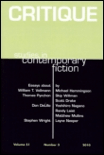
CRITIQUE-STUDIES IN CONTEMPORARY FICTION
Scope & Guideline
Celebrating the Rich Tapestry of Modern Literary Discourse
Introduction
Aims and Scopes
- Interrogation of Identity and Subjectivity:
The journal frequently addresses themes of identity, including gender, race, and sexuality, examining how these constructs influence and shape narrative perspectives and character development. - Exploration of Narrative Techniques:
A significant focus is placed on innovative narrative forms and techniques, such as metafiction, non-linear storytelling, and second-person narration, which challenge traditional literary conventions. - Cultural and Historical Contextualization:
Papers often situate literary works within broader cultural, historical, and political contexts, analyzing how contemporary issues, such as migration, capitalism, and environmental crises, are reflected in literature. - Theoretical Engagement with Literary Criticism:
The journal emphasizes theoretical frameworks, drawing from postcolonial theory, feminism, queer theory, and eco-criticism to deepen the understanding of texts and their implications. - Focus on Global Literature:
There is a consistent interest in global literature, particularly works from marginalized voices, allowing for a diverse range of perspectives and experiences to be represented.
Trending and Emerging
- Migration and Diaspora Narratives:
There is an increasing focus on themes of migration, diaspora, and transnational identities, reflecting contemporary global movements and their impact on personal and collective narratives. - Ecocriticism and Environmental Literature:
Emerging themes of ecocriticism highlight the intersection of literature and environmental issues, exploring how narratives engage with climate change and ecological crises. - Technological Influence on Literature:
An uptick in discussions surrounding the influence of technology on literature and narrative form, including digital storytelling and the impact of social media on contemporary narratives. - Interdisciplinary Approaches:
The journal is increasingly embracing interdisciplinary approaches, combining literary studies with insights from psychology, sociology, and political science to enrich literary analysis. - Revisiting Trauma and Memory:
There is a growing trend of revisiting themes of trauma and memory, specifically how these concepts are represented in contemporary literature, reflecting societal concerns over collective and personal histories.
Declining or Waning
- Traditional Literary Forms:
There is a noticeable decline in discussions centered on traditional narrative forms and canonical texts, as the journal increasingly favors contemporary and experimental literature. - Romanticism and Sentimentalism:
Themes associated with romanticism and sentimental narratives have become less prevalent, reflecting a shift towards more critical and often cynical examinations of human experience. - Focus on National Literature:
The journal has moved away from a strong emphasis on national literature, with fewer papers dedicated to exploring the literary contributions of specific nations, favoring a more global or transnational perspective. - Historical Narratives:
Papers that focus exclusively on historical narratives or historical fiction without a contemporary critique are appearing less frequently, suggesting a shift towards literature that engages with current issues. - Traditional Genre Boundaries:
There is a waning interest in adhering to traditional genre boundaries, with fewer works addressing specific genres like romance or mystery in conventional ways.
Similar Journals
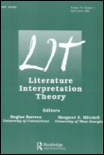
LIT-Literature Interpretation Theory
Challenging Norms, Redefining Interpretation.LIT-Literature Interpretation Theory is a premier academic journal that delves into the intricate relationships between literature and various interpretative theories, published by Routledge Journals, Taylor & Francis Ltd. With an ISSN of 1043-6928 and E-ISSN 1545-5866, this journal has established a notable reputation within the field, evidenced by its ranking in the 71st percentile among peers, and its placement in Q3 of the Literature and Literary Theory category for 2023. Since its inception in 1989 and continuing through 2024, LIT has aimed to provide a platform for the examination of literary texts through diverse theoretical lenses, catering not only to scholars and researchers but also to students and practitioners interested in literary discourse. Although it does not offer open access, the journal continues to be a vital resource for those seeking to enhance their understanding of literary theory within the arts and humanities. With robust insights and critical analyses, LIT contributes significantly to ongoing conversations in literature and promotes innovative interpretations that challenge conventional perspectives.
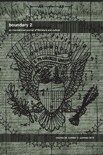
BOUNDARY 2-AN INTERNATIONAL JOURNAL OF LITERATURE AND CULTURE
Navigating the Complexities of Cultural NarrativesBOUNDARY 2: An International Journal of Literature and Culture, published by Duke University Press, stands as a pivotal platform for interdisciplinary discourse at the intersection of literature, culture, history, and the social sciences. With an ISSN of 0190-3659 and an E-ISSN of 1527-2141, this journal uniquely addresses the complexities of cultural narratives and theoretical frameworks from 2002 to the present. Although it is not an open-access publication, its rigorous scholarship and critical insights have positioned it within esteemed quartiles: Q3 in Cultural Studies, Q2 in History and Literature and Literary Theory, and Q4 in Sociology and Political Science for 2023. As the academic landscape evolves, BOUNDARY 2 continues to challenge conventional paradigms, making it an essential resource for researchers, professionals, and students eager to explore contemporary issues in literature and culture.
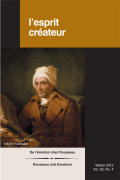
ESPRIT CREATEUR
Redefining Boundaries in Literary AnalysisESPRIT CREATEUR is a prestigious journal published by the Johns Hopkins University Press, renowned for its contributions to the fields of Literature and Literary Theory. Since its inception in 2002, the journal has become a vital platform for innovative scholarly discourse, achieving an impressive Q2 classification in the 2023 category rankings and a respectable rank of #546 out of 1106 in the Scopus Arts and Humanities - Literature and Literary Theory sector, situating it within the 50th percentile of the discipline. The journal's blend of critical perspectives offers readers insights into contemporary literary analysis and theory, making it essential for researchers, professionals, and students alike. Though it currently adheres to traditional access models, its commitment to fostering high-quality, peer-reviewed scholarship cements its status as a leading voice in literary studies, enhancing its role in academic research and education.
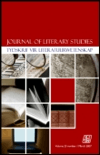
Journal of Literary Studies
Catalyzing scholarly exchange in the arts and humanities.Journal of Literary Studies, published by UNISA PRESS, is a premier open access journal dedicated to advancing the field of literature and literary theory. With its ISSN 0256-4718 and E-ISSN 1753-5387, the journal has established itself as a leading platform for innovative research since its inception in 1985, with a notable convergence period running through to 2024. Recognized in the Q1 quartile of literature and literary theory, the journal ranks impressively at #236 out of 1106 in its category according to Scopus, highlighting its impact in the arts and humanities with a percentile rank of 78th. The journal's open access model, adopted in 2022, reflects its commitment to accessibility and dissemination of knowledge globally, making it an essential resource for researchers, academics, and students alike. With an editorial focus on interdisciplinary approaches and contemporary critical discourse, the Journal of Literary Studies serves as a vital vessel for the exchange of ideas and scholarly dialogue in the intricate landscape of literary studies.

ENGLISH LANGUAGE NOTES
Inspiring Critical Thought in English Literary StudiesENGLISH LANGUAGE NOTES is a premier journal published by the University of Colorado, dedicated to the field of literature and literary theory. With a strong impact in academia, it holds a prestigious Q2 ranking in the 2023 category, emphasizing its importance among scholarly publications. The journal, indexed under ISSN 0013-8282 and E-ISSN 2573-3575, has been a crucial resource since its inception in 1969, featuring converged years from 1969, 1977, and 1982, through to 2024. The editorial board promotes rigorous scholarship and encourages contributions that explore the complexities of the English language across diverse literary contexts. While it does not offer open access, ENGLISH LANGUAGE NOTES remains a vital source for researchers, professionals, and students invested in the sustained exploration of literary arts, evidenced by its strong Scopus ranking in the 79th percentile in its field. For those committed to advancing literary scholarship, this journal serves as an invaluable platform for discussion and dissemination of influential ideas.
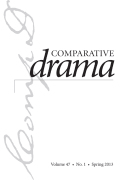
COMPARATIVE DRAMA
Celebrating the Rich Diversity of Theatrical TraditionsCOMPARATIVE DRAMA is an esteemed journal published by Western Michigan University that examines a broad spectrum of drama across cultures and time periods. With an ISSN of 0010-4078 and an E-ISSN of 1936-1637, this journal serves as a critical platform for researchers, educators, and students in the fields of literature and literary theory. Although classified in the Q3 quartile for 2023, its commitment to scholarly rigor and innovative discourse on comparative drama ensures its relevance in the academic community, garnering attention from a global audience. The journal is particularly valued for its interdisciplinary approach, making it a vital resource for those interested in exploring the interplay between dramatic texts and their cultural, historical, and social contexts. With a strong foundational focus that spans from 2002 to 2024, COMPARATIVE DRAMA continues to engage with contemporary issues surrounding theatrical practice and performance studies, paving the way for new interpretations and scholarly conversations.
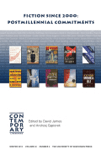
CONTEMPORARY LITERATURE
Connecting Scholars to the Pulse of Modern LiteratureCONTEMPORARY LITERATURE, published by the prestigious University of Wisconsin Press, stands as a vital platform for scholars and enthusiasts within the field of literary studies. With its ISSN 0010-7484 and E-ISSN 1548-9949, this journal has established itself as a respected source of innovative research across various dimensions of literature and literary theory. Holding an impressive Q2 ranking in the 2023 category of Arts and Humanities, this publication not only reflects current trends but also fosters critical discourse around contemporary authors and movements from 2002 to 2024. Engaging articles submitted to CONTEMPORARY LITERATURE enhance our understanding of narrative forms and their cultural relevance, making it an essential read for academics, professionals, and students alike. While the journal is not open access, its impact within the literary community continues to grow, as evidenced by its Scopus rank of #616 out of 1106. For those dedicated to exploring the evolving landscape of literature, CONTEMPORARY LITERATURE is a must-have in one's scholarly toolkit.
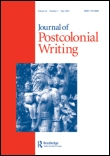
Journal of Postcolonial Writing
Navigating the Complexities of Literature and CultureJournal of Postcolonial Writing, published by ROUTLEDGE JOURNALS, TAYLOR & FRANCIS LTD, stands as a pivotal platform in the field of postcolonial studies and literary theory. Since its inception in 2005, this esteemed journal has cultivated a dedicated space for scholarly discourse, focusing on the complex interplay between literature, culture, and colonial histories. With an impressive Q1 ranking in the 2023 Literature and Literary Theory category and a notable Scopus rank of 97/1106, the journal occupies a vital place in the academic landscape, achieving a significant percentile of the 91st. Researchers and students alike will find the journal’s commitment to exploring diverse narratives and critical frameworks invaluable, making it an essential resource for those engaged in contemporary literary scholarship. Although not open access, readers can access high-quality research that contributes to meaningful conversations within the discipline, supporting the journal’s objective to foster interdisciplinary collaboration and innovation.

TEXT & KRITIK
Navigating the evolving landscape of literary thought.TEXT & KRITIK, an esteemed academic journal published by EDITION TEXT KRITIK GMBH in Germany, serves as a critical platform for advancing scholarship in the fields of literature and literary theory. With an ISSN of 0040-5329, this publication aims to foster rigorous discourse and stimulate intellectual inquiry from 2009 to 2023, reflecting the evolving landscape of literary studies. Although categorized in the fourth quartile (Q4) in the 2023 measure of literature and literary theory, TEXT & KRITIK consistently engages with a diverse array of literary perspectives and methodologies, addressing both historical texts and contemporary literature. Researchers, professionals, and students alike are encouraged to explore this resource to deepen their understanding of critical texts and theoretical frameworks. While it does not currently operate on an open access model, its curated content remains a vital resource for anyone dedicated to exploring the nuances of literary analysis and criticism.
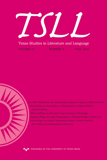
TEXAS STUDIES IN LITERATURE AND LANGUAGE
Illuminating Language and Literature from the Lone Star StateTEXAS STUDIES IN LITERATURE AND LANGUAGE, published by University of Texas Press, is a distinguished scholarly journal dedicated to the exploration of the rich tapestry of literature and language from Texas and its encompassing regions. With its ISSN 0040-4691 and E-ISSN 1534-7303, this journal serves as a vital platform for researchers, educators, and students interested in the intersection of cultural studies, literary analysis, and linguistic inquiry. Despite the absence of Open Access, the journal remains an essential resource for those seeking rigorous academic discourse within the humanities. The journal, established in 1974, has published influential articles that contribute to a deeper understanding of Texas's unique literary heritage, making it a beacon of scholarship in American literature. The impact factor reflects its relevance and engagement in ongoing literary dialogues. We invite scholars and students alike to engage with the rich content provided, ensuring that Texas's literary legacy continues to be studied and celebrated.